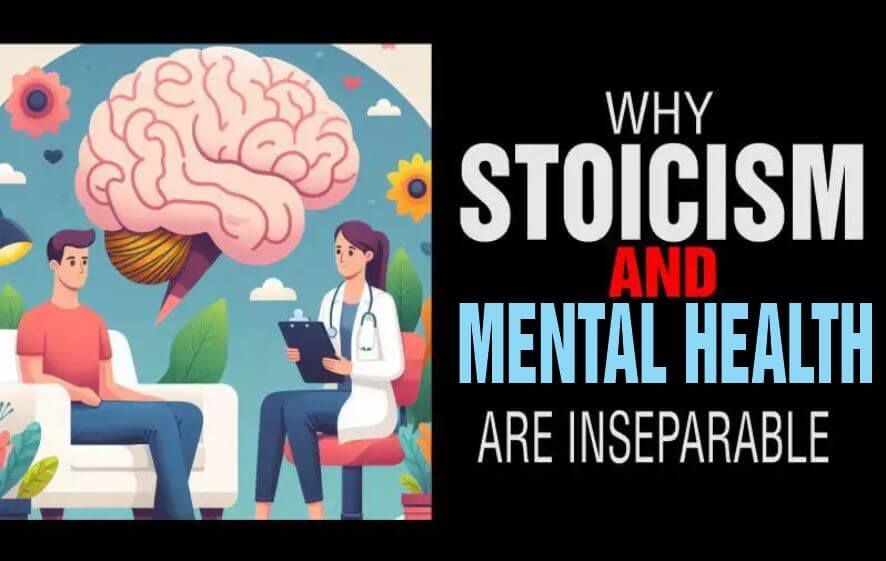Last updated on June 8th, 2025 at 01:54 pm
Discover why Stoicism and mental health are inseparable and how this ancient philosophy impacts mental well-being.
While you might be a stoic personality or practice one of these philosophies of Stoicism by chance, nothing beats being deliberate about it.
From 2024, you are going to be deliberate about your mental health – protect it, and avoid stress and worry, because it is going to be a tough time ahead.
The field of mental health has seen a significant rise in popularity and interest in recent years.
Everyone seeks ways to improve their mental well-being and achieve a state of balance and contentment.
Research by Birkbeck, University of London on Stoicism and its impact on mental health shows that applying a Stoic mentality benefits those at risk of anxiety and depression.
One philosophy that has gained attention for its practical approach to handling life’s challenges and improving mental health is Stoicism.
Stoicism offers valuable insights and techniques that can be applied to enhance mental health and overall well-being.
We have simplified the relationship between stoicism and mental health, laying bare the potential benefits it can provide.
Table of Contents
- An Overview of What Stoicism Is
- Stoicism is not about Suppressing Emotions
- My Experience with Stoicism and Mental Health
- The Relationship between Stoicism and Mental Health
- Stoic Strategies for Improving Mental Health
- Embracing Stoic Principles in Daily Life
- Frequently Asked Questions
- Conclusion
An Overview of What Stoicism Is
Stoicism originated in ancient Greece around 300 BCE and was further developed by notable practitioners such as Epictetus, Seneca, and Marcus Aurelius.
Its core teachings revolve around the belief that you have control over your thoughts, emotions, and reactions, regardless of external circumstances.
Stoics emphasize the importance of cultivating virtue, living by nature, and understanding that your happiness and well-being lie within your control.
You must put effort into finding how your reactions to emotions interplay to bring about stress and unhappiness, and how you can juggle these interplaying for the sake of your mental health in 2024 and beyond.
Related: Introduction to Life Mastery
Stoicism is not about Suppressing Emotions

Stoicism does not advocate for the suppression of emotions but rather promotes understanding and mastery over them.
It encourages you to acknowledge and process your emotions with rationality and mindfulness.
Through emotional awareness and acceptance, Stoicism enables you to respond to your emotions in a balanced and constructive manner.
Rather than suppressing emotions, Stoicism teaches you to cultivate resilience and inner strength, allowing you to navigate life’s challenges with clarity and composure.
This approach is good for emotional well-being by promoting a healthy relationship with your emotions, ultimately leading to mental stability.
Related: Settling Relationship Conflicts the Stoic Way
My Experience with Stoicism and Mental Health
I have been a stoic person right from time, even before knowing what Stoicism is about, but I was never deliberate towards it.
I would sit for an examination after intense preparation, and I will accept the outcome so far, I don’t have much to do to change things.
I try as much as I cannot to worry or let it rob me of my sleep.
One particular event that made me know I am solid in Stoicism was when I lost my dad in 2018.
The most heartbreaking thing I have experienced as a human.
People lose their loved ones, but the events that led to their death are the type that could haunt someone till they are on that same path.
I had a heart of steel that I leaned on the emotional battering and bathed myself with it.
I visited him every week in the morgue and spoke with him until he was laid to rest.
This helped in bringing me to terms with myself and blocked the possibility of mental distress.
And that has been my attitude towards life. I try my best to better my life and worry less about the things that don’t work.
Let’s see how you can achieve the same mental bulwark to shut off every negative and unhealthy element that will trigger mental health issues with these Stoic tips.
Related: Attaining Fulfillment in Relationships with Stoicism
The Relationship between Stoicism and Mental Health

Let’s take a look at how the Stoic philosophy and principles can help you cultivate good mental health.
1. How Acceptance and the Present Moment Influence Mental Health
The first aspect of stoicism that is particularly relevant to mental health is its focus on acceptance and embracing the present moment.
In Stoicism, acceptance and living in the present moment are pivotal for mental well-being.
Many mental health issues stem from excessive worry about the past or future, leading to anxiety and stress.
Stoicism teaches individuals to acknowledge and accept the realities of the present moment, striving to find inner peace amidst external chaos.
This does not mean you won’t strive for a better life, but not in a way that suggests desperation.
By training the mind to focus on the here and now, you can experience reduced anxiety and achieve a greater sense of calm and contentment.
Embracing the concept of “amor fati” (love of fate), you learn to accept the things beyond your control.
This brings inner peace and a serene mind by letting go of anxieties about the past or future.
This practice cultivates mindfulness, reducing stress and promoting emotional resilience.
By embracing acceptance and living in the present, Stoicism offers a powerful framework for you to find contentment and tranquility, ultimately contributing to your overall mental well-being.
Related: Debunking Misconceptions about Stoicism
2. How Self-reflection and Self-awareness Affect Mental Health
Another aspect of stoicism that can positively impact mental health is its emphasis on self-reflection and self-awareness.
By examining your thoughts and actions, you gain self-awareness and emotional regulation.
Stoics encourage the practice of self-examination, understanding your values, and living by them.
You can achieve this by assessing your responses to external events, promoting resilience, and reducing how you react to events.
If your reaction to events is worry and complaints, it will have negative effects on your mental health.
Engaging in regular introspection allows you to identify negative patterns of thinking, unhelpful beliefs, and unhealthy habits that may be causing mental distress.
By recognizing these patterns, you can then take deliberate steps towards changing their perspective and adopting healthier ways of thinking.
Through self-reflection, Stoicism offers a pathway to improved mental well-being by empowering you to navigate life’s challenges with clarity and composure, ultimately leading to greater emotional stability and contentment.
Related: The 4 Virtues of Stoicism
3. How Distinguishing What is Within Your Control and What is not Helps in Mental Health
A lot of people battle with this as it is difficult for them to distinguish where to invest emotional energy.
The Stoic philosophy of distinguishing what is within your control and what is not is profoundly beneficial for mental health.
By focusing on what they can control – such as their thoughts, actions, and attitudes – individuals can alleviate anxiety about external factors.
This practice brings about a sense of empowerment and resilience, reducing stress and promoting emotional well-being.
Stoics believe that external events, circumstances, and even the opinions of others are beyond your control.
While you might convince people to change their views, everyone has their interests, and you can’t succeed every time.
These put stress on your mental health, and when it is consistent, it wears out your mental wellness.
Instead of allowing these external factors to dictate your emotions and well-being, stoicism encourages you to focus on what you have power over, like your attitudes, beliefs, actions, and reactions to these events.
This mindset shift can be particularly beneficial in managing mental health issues such as anxiety and depression, as you learn to let go of the need for external validation and find empowerment within yourself.
Related: Unveiling the Principles of Stoicism
4. The Importance of Resilience in Mental Health
Life is filled with challenges, setbacks, and disappointments, all of which can take a toll on your mental health.
The Stoic philosophy of resilience is instrumental in promoting mental well-being.
When you embrace adversity as an opportunity for growth, you improve your emotional strength and fortitude.
These obstacles are an inherent part of life and, rather than being sources of suffering, they present an opportunity for growth and self-improvement.
This resilience enables you to navigate life’s challenges with a sense of purpose and determination, reducing the impact of stress and anxiety.
Stoicism encourages you to confront difficulties with courage and perseverance, ultimately leading to greater emotional stability and mental health.
By cultivating resilience, Stoicism equips you with the tools to weather life’s storms with grace and composure, contributing to your overall mental health and well-being.
Related: Why the World Needs More Stoic Men
5. Relationship between Gratitude and Appreciation, and Mental Health

Gratitude and appreciation have consistently been shown to have a positive impact on mental health, increasing overall happiness and well-being.
Stoics remind us to express gratitude for the things we often take for granted, such as our health, relationships, and the beauty of nature.
These things have become a part of our daily lives, and we forget how important they are.
By focusing on what we have rather than what we lack, stoicism enables us to develop a more positive outlook and find joy in the simplest of things.
When you practice gratitude, you enjoy positive emotions, reduce stress, and enhance positive mental feelings on both the physical and emotional levels.
By acknowledging and appreciating the present moment and life’s blessings, you can experience a profound sense of fulfillment and emotional well-being.
Related: How to Thrive in the Present Moment
Stoic Strategies for Improving Mental Health
1. Negative Visualization
One primary method is the practice of negative visualization, which involves imagining the loss of something or someone you value.
This practice encourages individuals to appreciate what they have and reduces anxiety over potential future losses.
By contemplating the worst-case scenarios in a controlled environment, individuals can diminish the fear that often accompanies uncertainty.
For instance, if someone fears losing their job, they can visualize their life post-loss, thus mentally preparing for the outcome while fostering gratitude for their current position.
2. Journaling
Another effective Stoic strategy is journaling, which serves as a powerful tool for self-reflection and emotional regulation.
By writing down thoughts and experiences, individuals can process their emotions more clearly.
A common practice is the evening reflection, where one examines the events of the day, their reactions, and what could be improved.
This exercise not only enhances self-awareness but also helps individuals recognize negative thought patterns and replace them with more constructive ones.
For instance, instead of dwelling on a perceived failure, one might note the valuable lessons learned, thus reinforcing a growth mindset.
3. Gratitude
Additionally, the practice of gratitude, central to Stoic philosophy, can radically transform an individual’s mental outlook.
It involves consciously acknowledging and appreciating the positive aspects of life, which can counterbalance negative thoughts.
A practical approach is to maintain a gratitude journal, where one lists three things they are grateful for each day.
This simple yet effective habit fosters a more positive mindset and reinforces the importance of focusing on what is within one’s control, a key tenet of Stoicism.
Embracing Stoic Principles in Daily Life
Leveraging Stoic principles in daily life can have serene effects on mental health, but it is important to note that Stoicism is not about suppressing emotions or becoming apathetic, as explained at the beginning of this article.
Stoics do experience a full range of emotions; however, they practice mindfulness, cognitive reframing, and positive affirmations to avoid being consumed by negative emotions and maintain an overall sense of tranquility.
Frequently Asked Questions
How does Stoicism relate to mental health?
Stoicism promotes emotional resilience, mindfulness, and acceptance, fostering mental well-being through its emphasis on rationality and inner strength.
What is a Stoic quote for mental health?
Stoic Quote: “We suffer more often in imagination than in reality.” – Seneca
Can a Stoic get depressed?
A Stoic can experience depression, but Stoicism offers tools for managing and understanding emotions, potentially mitigating their impact.
Can Stoicism help depression?
Stoicism can provide coping mechanisms and a philosophical framework for managing depression, offering perspectives on acceptance, resilience, and finding meaning.
Conclusion
The relationship between Stoicism and mental health is a healthy one and this article has offered valuable insights and practices that can significantly contribute to overall well-being.
Its teachings on acceptance, self-reflection, focusing on what is within our control, resilience, and gratitude provide you with practical tools to navigate life’s challenges and find fulfillment.
Applying Stoic principles can empower you to take charge of your mental well-being, reduce anxiety, and cultivate a more positive outlook on life.
References:
- https://www.bbk.ac.uk/news/birkbeck-study-on-stoicism-and-its-impact-on-mental-health-1
- https://my.wlu.edu/Documents/mudd-center/journal-vol-5/stoic-eudaimonia.pdf
- https://modernstoicism.com/3934-2/
- https://stoicquotes.com/stoic-mental-health/
Pious Clements is the insightful voice behind "The Conducts of Life" blog, where he writes about life ethics, self-development, life mastery, and the dynamics of people and society.
With a profound understanding of human behaviuor and societal dynamics, Pious offers thought-provoking perspectives on ethical living and personal growth.
Through engaging narratives and astute observations, he inspires readers to navigate life's complexities with wisdom and integrity, encouraging a deeper understanding of the human experience and our place within society.

